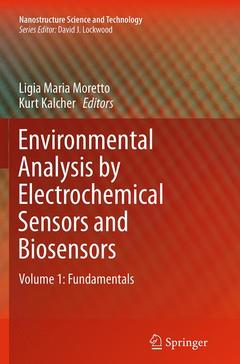Description
Environmental Analysis by Electrochemical Sensors and Biosensors, Softcover reprint of the original 1st ed. 2014
Fundamentals
Nanostructure Science and Technology Series
Coordinators: Moretto Ligia Maria, Kalcher Kurt
Language: English
Subjects for Environmental Analysis by Electrochemical Sensors and...:
Publication date: 08-2016
Support: Print on demand
Publication date: 11-2014
713 p. · 15.5x23.5 cm · Hardback
Description
/li>Contents
/li>Biography
/li>Comment
/li>
The first three chapters discuss fundamentals, and the last three chapters cover the main groups of analytes of environmental interest.
Section 1
Environmental analysis
Chapter 1
Introduction to Environmental Electroanalysis
Chapter 2
Soil
Chapter 3
Water
Chapter 4
Atmosphere
Chapter 5
Biosphere
Chapter 6
Extraterrestrial
Section 2
Fundamental Concepts of Sensors and Biosensors
Chapter 7
Electrochemical Sensors and Biosensors
Chapter 8
Electrochemical Sensors in Environmental Analysis
Chapter 9
Potentiometric Sensors
Chapter 10
Controlled potential techniques in amperometric sensing
Chapter 11
Biosensors on Enzymes, Tissues and Cells
Chapter 12
DNA Biosensors
Chapter 13
Immunosensors
Chapter 14
Other types of sensors: impedance-based sensors, FET sensors, acoustic sensors
Section 3
Sensor Electrodes and Practical Concepts
Chapter 15
Macro-, Micro- and Nanoelectrodes
Chapter 16
Electrode materials (Bulk Materials and Modification)
Chapter17
Nanosized materials in amperometric sensors
Chapter 18
Electrochemical Sensors – Practical Approaches
Chapter 19
Gas Sensors
Section 4
Sensors with Advanced Concepts
Chapter 20
Sensor arrays - Arrays of micro- and nanoelectrodes
Chapter 21
Sensors and Lab on Chip
Chapter 22
Electronic Noses
Chapter 23
Remote Sensing
Ligia Maria Moretto graduated in Chemical engineering at the Federal University of Rio Grande do Sul, Brazil, and received her PhD in 1994 from the University Ca’ Foscari of Venice with a thesis “Ion-exchange voltammetry for the determination of copper and mercury. Application to seawater.” Her academic career began at the University of Caxias do Sul, Brazil, and followed at the Research Institute of Nuclear Energy, Sao Paulo, Brazil. In 1996 she had the habilitation as researcher in analytical chemistry at the University Ca’ Foscari of Venice. Working at the Laboratory of Electrochemical Sensors, her research field is the development of electrochemical sensor and biosensors based on modified electrodes, the study of gold arrays and ensembles of nanoelectrodes, with particular attention to environmental applications. She has published more than 60 full papers, several book chapters, and has presented 90 contributions at international conferences, resulting in more than 1100 citations. Dr. Moretto also collaborates as an invited professor and invited researcher with several institutions in Brazil, France, Argentina, Canada and USA.
Kurt Kalcher completed his studies at the Karl-Franzens University (KFU) with a dissertation in inorganic chemistry entitled “Contributions to the Chemistry of Cyantrichloride, CINCCI2”; he also received his PhD in 1980 from the same institution. In 1981 he then went for a postdoctoral stay at the Nuclear Research Center in Jülich (Germany) under the supervision of Professor Nürnberg and Dr. Valenta, and conducted intensive electroanalytical research while he was there. Dr. Kalcher continued his academic career at KFU with his habilitation on chemically modified carbon paste electrodes in analytical chemistry in 1988. Since then, he has been employed there as an associate professor. His research interests include the development of electrochemical sensors and biosensors for the determination of inorganic and bi
Focuses on the use of electrochemical sensors and biosensors
Focuses on theoretical considerations and practical applications for environmental analysis
Addresses thoroughly and exhaustively all relevant parameters, specific analytes, and groups of chemical substances important in the environment
Includes supplementary material: sn.pub/extras




